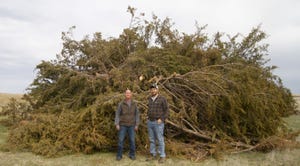Immigration Ruling Renews Agriculture’s Call For Reliable Labor Law
The recent Supreme Court ruling on Arizona's controversial immigration law means agriculture must keep its nose to the grindstone to convince Congress to make positive farm labor law changes, says Arizona farmer Kevin Rogers, Arizona Farm Bureau Federation president.Voters would support sensible and incremental reforms that begin to address the broken system employers currently face. Addressing the needs of agriculture is the place to begin, says Western Growers President Tom Nassif of Irvine, Calif.
June 28, 2012

Agricultural leaders contend the U.S. Supreme Court’s recent ruling on Arizona’s controversial immigration law means industry organizations must continue to push Congress to modify farmworker laws to provide a more reliable and legal labor supply for businesses including agriculture.
“The Supreme Court ruling means that we’ll continue to keep our nose to the grindstone and work with Congress and our elected leaders for positive farm labor changes,” said Kevin Rogers, a Mesa, Ariz., farmer and Arizona Farm Bureau Federation president.
“The bottom line is the federal government needs to step up and fix the visa labor program so we can have the needed legal workers in this country for agriculture and other industries.”
The High Court ruling June 25 struck down portions of Arizona’s immigration law (Senate Bill 1070); declaring state immigration laws cannot pre-empt federal immigration laws. The court allowed the law’s main component to stand which allows a police officer to stop a person if suspicion exists regarding whether the person is illegally in the country.
Tom Nassif, Western Growers president, Irvine, Calif., echoed the needs for Congress to finally move on immigration reform.
“The Supreme Court decision highlights the need for federal legislative action on immigration reform. Congress needs to take action on these issues.”
(For more, see: H-2A salvation for labor-intensive agriculture?)
Congress should address these issues, Nassif said, in a long-term and unified manner.
“Voters would support sensible and incremental reforms that begin to address the broken system employers currently face,” Nassif said. “Addressing the needs of agriculture is the place to begin.”
Western Growers’ members in California and Arizona grow, pack, and ship about 90 percent of the fresh fruit, nuts, and vegetables grown in California and 75 percent of the same commodities produced in Arizona.
United Fresh, a Washington, D.C.-based company which represents many sectors of the U.S. produce industry, believes the Supreme Court decision could add instability in produce-growing states with immigration laws on the books similar to the Arizona law.
“This labor force instability could impact farm employers across the country because of the migratory nature of labor in the produce industry,” United Fresh said in an official statement.
The Supreme Court’s decision underscores the immediate need for a comprehensive and practical guest worker program for agriculture to enable produce industry employers to remain viable and competitive, said United Fresh.
Jerry Kozak, president and chief executive officer, National Milk Producers Federation, Arlington, Va., believes immigration-related decisions in recent weeks highlight the need to finally resolve the “immigration reform conundrum.”
The mixed high court ruling, Kozak said, along with the recent executive order by the Obama administration to stop the deportation of some young undocumented individuals, fully illustrate how the issue of immigration reform remains controversial and divisive.
“These developments also show how critically necessary it is to resolve the immigration policy conundrum, especially for farmers and other employers concerned with maintaining and recruiting a workforce,” Kozak said.
You May Also Like
.png?width=300&auto=webp&quality=80&disable=upscale)


